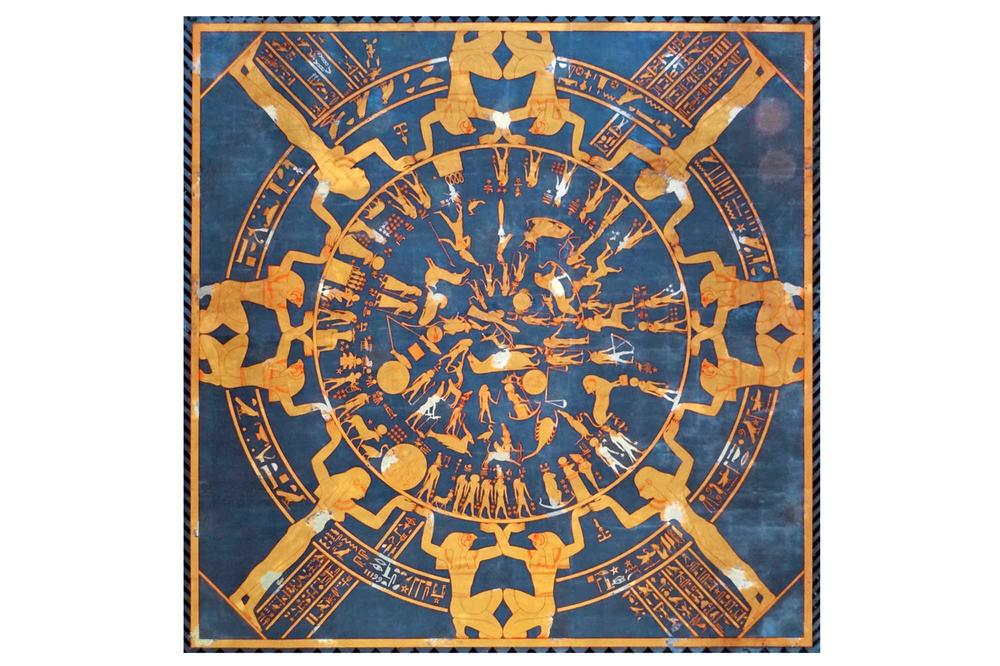When the Babylonians Invented the Horoscope
Shining a Light on the Knowledge Practices of Ancient Cultures and Communities
Jul 14, 2022
The original is on display in the Louvre. Ancient zodiac from the city of Dendera in Egypt (1st century BCE).
Image Credit: Wikicommons
Is it specious to ask whether the opening of a new institute at Freie Universität took place under a lucky star? Born on June 17, 2022, the Institute for the History of Knowledge in the Ancient World has the zodiac sign Gemini with Virgo ascendant. At 11:00 a.m., the time the opening ceremony began, the Sun was in the 9th house and Mercury in the 8th house, suggesting that the institute might be quite curious and geared toward understanding people. Jupiter in the 6th house indicates that it will adhere to high standards in professional dealings with others.
Science or Superstition?
Of course, many people would say that such predictions and horoscopes are nothing but superstition. However, all of the components – the zodiac (in Latin zodiacus, from the Greek word zodiakós), the zodiac signs, the astronomical calculation of the planetary positions, and the astrological interpretation of the whole – can be traced back to a scientific and cultural revolution that is being investigated and interpreted at this new Institute for the History of Knowledge in the Ancient World.
As head of the research project “ZODIAC – Ancient Astral Science in Transformation” in the newly established institute, historian of science Professor Mathieu Ossendrijver will spend the next five years exploring this zodiacal turn, which took place in ancient Babylon 2500 years ago, i.e., around 500 BCE.
Mathieu Ossendrijver is not only specialized in the history of ancient science and Assyriology, but he is also an astrophysicist. This is advantageous in that the ZODIAC project aims to deal with the birth of Babylonian astral science, i.e., horoscopy.
Ossendrijver points out that several elements had to come together in order for the Babylonians to be able to invent the zodiac signs and the horoscope. First, they had already observed and recorded the movements of the celestial bodies, the stars and planets, and recognized regularities and patterns in them. Second, the Babylonians went beyond mere empirical observation and developed various mathematical techniques and tools that enabled them to mathematically calculate and predict the orbits of the planets and stars. Ossendrijver calls that the mathematical turn, which was part of the zodiacal turn.
This background casts light on the significance of the invention of the zodiac 2500 years ago. On the basis of their observations and calculations, the Babylonians divided the sky into twelve areas, each of which was assigned a figure, a name, and a specific meaning. This became the zodiac with its twelve zodiac signs such as Aries, Gemini, Virgo, or Leo.
Ancient historian, Assyriologist, astrophysicist: Mathieu Ossendrijver heads a research group at the newly founded Institute for the History of Knowledge in the Ancient World.
Image Credit: Lorenz Brandtner
Finally, the Babylonian astral scientists created a body of knowledge that enabled them to assign meanings and contexts of meanings based on their calculations of which planets were where in the zodiac at which point in time.
What actually is the zodiac that the Babylonians invented and that today still serves as the basis for horoscopes in magazines? Ossendrijver says that it is actually a band or a streak of sky that encompasses the area a few degrees below and a few degrees above the apparent orbit of the Sun and the apparent orbits of the Moon and the planets. He says, “The zodiac is not visible to the eye. Rather, the Babylonians invented a mathematical construction, which they then divided into twelve parts of 30 degrees each. They named each section after the constellation most prominent in it.”
This calculating astrology, which places the Sun in the 8th house and Saturn in the 5th house, makes it possible to speculate what it means for an individual – or an institute – to be born at a particular time and place.
How Has the Interpretation of Ancient Babylonian Signs Survived So Long?
According to Ossendrijver, the Babylonians viewed the stars and the celestial phenomena as divine signs conveyed to people. The position of the planets at the birth of a child reveals something about the child, and astrology serves to decipher and understand the divine message.
But why did horoscopy become so successful, and indeed remain successful? How was it possible that Babylonian astral science first spread throughout the ancient world and into the Roman Empire, then into Judaism, Christianity, and Islam? How could it persevere so persistently that people still study their horoscope at the beginning of the year to find out, for example, whether the New Year will bring them luck in love or maybe a setback at work? Ossendrijver thinks it is because horoscopy appeals to the human desire to find out something about one’s own future.
On the other hand, the abstract system of numbers and constellations is convincing. It can be translated very easily, regardless of a specific language, history, or script. The researchers are just getting a good start. The Institute for the History of Knowledge in the Ancient World, directed by Professor J. Cale Johnson, a specialist in the history of knowledge in the ancient world, has just taken up its work. It would not be giving away too much to say: The answer is in the stars.
This article originally appeared in German on July 2, 2022, in the Tagesspiegel newspaper supplement published by Freie Universität Berlin.
Further Information
- Professor Mathieu A.J.H. Ossendrijver, Department of History and Cultural Studies, Institute for the History of Knowledge in the Ancient World, ZODIAC – Ancient Astral Science in Transformation, Email: mathieu.ossendrijver@fu-berlin.de
- Professor J. Cale Johnson, Department of History and Cultural Studies, Institute for the History of Knowledge in the Ancient World, Email: cale.johnson@fu-berlin.de


